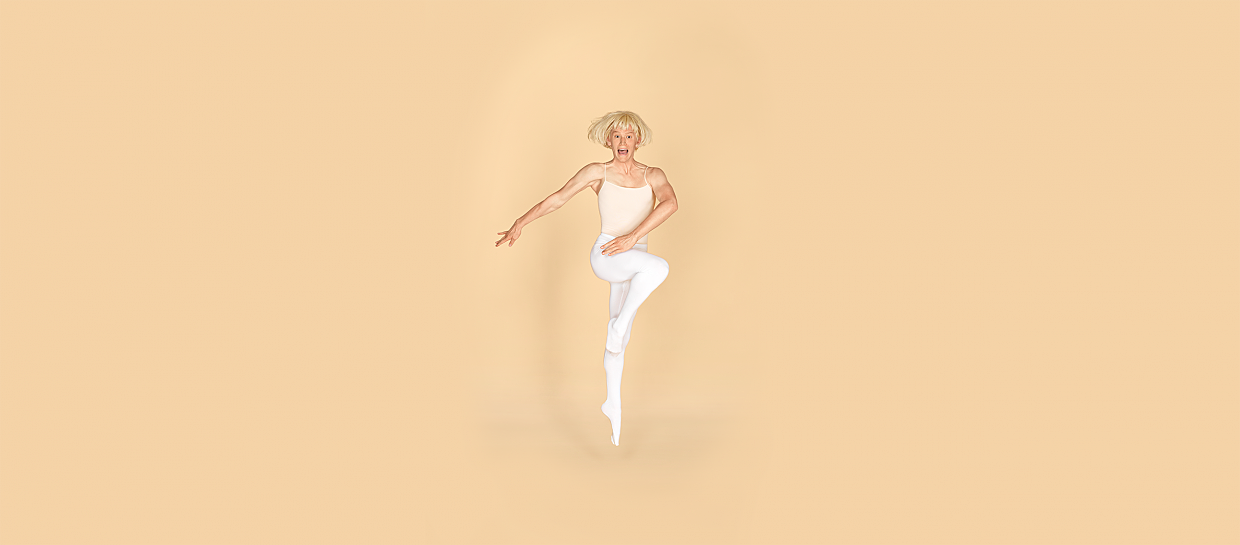Beyond the Good Room
Chris Parker's frantic, unruly and tender autobiographical show, No More Dancing in the Good Room, opens on Wednesday. Here, he reflects on a childhood of dancing in secret spaces and coming out to his parents.
When I was eight, my parents decided to go to Noosa for a week. My little sister had just been born — their fourth child — and they needed a break from the rest of us. I was over the moon about the situation. Mum and Dad going away meant one thing: me, dancing in the Good Room.
The Good Room was exactly what it sounded like. It was a room at the very end of our childhood home in Christchurch, decorated with a ceramic golden angel above the fireplace and bowls of musky potpourri on long tables. It didn’t get a lot of sun but it had a lovely view of the garden, not that you could tell because we hardly ever used it. As a child, it was strictly out of bounds and was only ever occupied for special events, like adult wine-and-cheese parties or Christmas.
I was a pretty dramatic kid growing up. I had a lot of feelings, and I struggled to keep them contained. Dancing around the house (and ideally dancing in the Good Room) was how I accessed those feelings. Mum and Dad would try to convince me that the kitchen was a better dancing space, but there wasn’t enough room and everyone was always coming in to make messy omelettes or to get a glass of water. It was not ideal. I preferred the isolation and decadence of the Good Room. It was clearly the “goodest” room in the house and therefore the only room worthy of my shows.
With Mum and Dad away in Noosa, there was only a teenage babysitter to contend with — and she was the kind of babysitter who let us eat jelly for dinner. The Good Room was mine. One afternoon, I ventured in and turned the stereo on. The song was ‘One For Sorrow’ by '90s pop group Steps. A complete power ballad. It was perfect. I lost myself in the beat, my limbs stretching out — free, finally — across the Good Room carpet, but then with a single, lanky arm the worst possible thing happened: I hit the golden angel above the fireplace. It fell, smashing into a thousand pieces on the tiles below.
I felt so sick. I shouldn’t have gone into the Good Room. I shouldn’t have danced. I wanted to rewind time. I had to do something. Cover my tracks. Through a stream of tears, I picked up each and every broken piece of the angel and hid them in the fireplace, underneath some fake pinecones.
I didn’t sleep for the next four days. I lay in bed, tormented by the anticipation of what was to come: Mum and Dad would come home. Mum would find out about what had happened. My life would never be the same again.
When they finally discovered what I’d done, I was banned from dancing in the Good Room. I was banned from dancing in the house altogether. If I wanted to dance, I had to dance outside, or in the garage.
I think for other people, this might have been an insignificant childhood event, but for me its impact was huge. It was the first time I really had to deal with my shit. I could have confessed. That would have been the responsible thing to do, but the fact that I left the evidence there, at the crime scene, under some terrible fake pinecones – when I’m honest with myself, I know I wanted Mum to find out herself, so that I didn’t have to initiate the conversation about what I had done. I wanted her to bring the angel to me, to solve my problem for me.
It took me a really long time to tell my parents I was gay. My friends would try to convince me to tell them. They’d remind me how supportive and loving they were. They'd try to unpack what was holding me back.
It was a bit like that broken angel, poorly hidden in the fireplace. I was waiting for them to find out, leaving it hidden in plain sight. But the discovery this time I didn’t have anything to hide, and that this time, nothing was going to stop me from dancing.
No More Dancing in the Good Room
runs at Q Theatre
3-13 February


